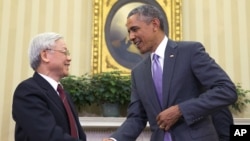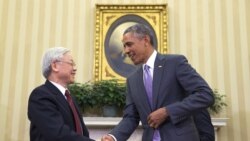This year marks the 20th anniversary of the normalization of relations between the United States and Vietnam. In recognition of the progress achieved in U.S.-Vietnam relations, President Barack Obama recently welcomed General Secretary of the Central Committee of the Communist Party of Vietnam Nguyen Phu Trong to the White House.
Over the past two decades, we’ve made tremendous strides in our bilateral relationship, as General Secretary Trong’s visit so clearly demonstrated. Bilateral trade has grown 80-fold to more than $36 billion. U.S. investment in Vietnam now tops $1.3 billion. And there is more than $1 billion in Vietnamese investment every year in the United States, helping to support American jobs.
Our two countries -- in close coordination with other partners -- are working to conclude the Trans-Pacific Partnership (TPP) agreement, which could potentially create significant job growth and prosperity for both the Vietnamese and the American people, and further expand our growing economic ties.
We’ve also made significant progress in deepening cooperation in a wide range of areas, including education, science and technology, climate change, public health, and security issues. And we’re committed to further strengthening cooperation on regional and global issues of mutual interest.
We share concern about recent developments in the South China Sea and recognize the imperative of upholding the international rules and norms -- including freedom of navigation -- that have underwritten the region’s dramatic economic growth.
These achievements have been possible thanks to the constructive effort of leaders in both countries to rise above the past, overcome differences, and promote shared interests with an eye to the future.
Of course, as President Obama noted, there remain differences in the bilateral relationship, including over issues of human rights and freedom of religion.
But through the diplomatic dialogue and practical steps being taken by both countries, we trust these tensions can be resolved in an effective fashion. Indeed, the Trans-Pacific Partnership offers a powerful and pragmatic incentive for accelerating reform and fostering a freer and more open society.
U.S.-Vietnam relations today set a powerful and compelling example to the world of what is possible when former adversaries can overcome a difficult history to make peace and work together for the peace and prosperity of their citizens and the world beyond.






